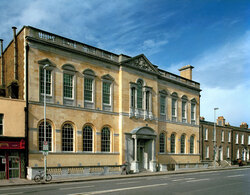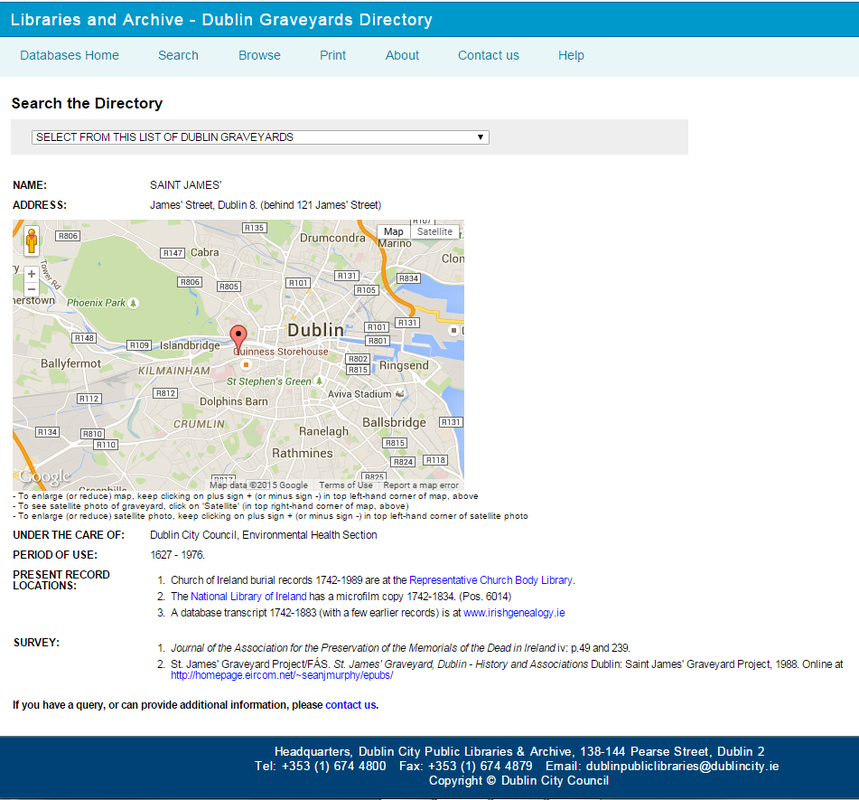Dublin City Library and Archives
 Dublin City Library
(photo: Wikimedia Commons)
Dublin City Library
(photo: Wikimedia Commons)
The following words of wisdom are based on my own experiences. Please get in touch if you can add to this advice with your own observations.
What is this archive and what might you find there?
Dublin City Library and Archives are located in Pearse St., not far from Trinity College Dublin's north-eastern corner. Check their main website for opening hours and details of special exhibitions they host in their entrance lobby. They also play host to talks and society meetings throughout the year so make a note of the location.
You need to show proof of Irish residency to be issued with a borrower's ticket but visitors with photo identification can easily obtain a Research Card to gain access to the City Archives reading room ... which you will find replete with snoozing students making the most of the free wi-fi! The reading room has terminals to access the on-line collections (more below) and open shelving on which I found some beautiful original editions of the Treble Almanac of Dublin complete with rare original fold-out maps. According to their website these date from 1752 - you won't find these on-line!
How to find your way to treasure in this archive, in person or remotely?
If you do visit in person, you can get access to a number of on-line important Irish genealogical resources for free including the Irish Newspaper Archives and the Irish Times Digital Archive, both of which can be pricey to sign up to individually, so make a plan and make the most of these resources if you are on a research trip.
You should also study the details of the collections described on their Heritage and History page, as you may need to order up items in advance.
The most relevant resource for family historians researching from afar used to be their free-to-search Dublin City Databases, which owed their existence to the trusty endeavours of John Grenham. Unfortunately the site has been taking down pending redevelopment, so in the meantime, John has made available some of the transcribed data on his own website at DCLA Databases. Be sure to read up on the background to the lists to understand what you are searching. There are names to search for,
There is also the most splendid Graveyards Directory accessible via a lovely map full of pinned locations. These highlight the location of various graveyard and provide information on what records might have survived and where they might be, plus details of any transcripts, articles or books that the burials might appear in - just brilliant! In the following example for St. James' in Dublin, not only are you directed to the burial transcripts that appear on the Irish Genealogy site, but there are also some links to some publications by Sean Murphy which tell you so much more about the graveyard.
What is this archive and what might you find there?
Dublin City Library and Archives are located in Pearse St., not far from Trinity College Dublin's north-eastern corner. Check their main website for opening hours and details of special exhibitions they host in their entrance lobby. They also play host to talks and society meetings throughout the year so make a note of the location.
You need to show proof of Irish residency to be issued with a borrower's ticket but visitors with photo identification can easily obtain a Research Card to gain access to the City Archives reading room ... which you will find replete with snoozing students making the most of the free wi-fi! The reading room has terminals to access the on-line collections (more below) and open shelving on which I found some beautiful original editions of the Treble Almanac of Dublin complete with rare original fold-out maps. According to their website these date from 1752 - you won't find these on-line!
How to find your way to treasure in this archive, in person or remotely?
If you do visit in person, you can get access to a number of on-line important Irish genealogical resources for free including the Irish Newspaper Archives and the Irish Times Digital Archive, both of which can be pricey to sign up to individually, so make a plan and make the most of these resources if you are on a research trip.
You should also study the details of the collections described on their Heritage and History page, as you may need to order up items in advance.
The most relevant resource for family historians researching from afar used to be their free-to-search Dublin City Databases, which owed their existence to the trusty endeavours of John Grenham. Unfortunately the site has been taking down pending redevelopment, so in the meantime, John has made available some of the transcribed data on his own website at DCLA Databases. Be sure to read up on the background to the lists to understand what you are searching. There are names to search for,
- Voters 1899, 1908-1915
- Freemen to 1774
- Cemeteries Burial Registers (Clontarf, Drimnagh & Finglas only)
There is also the most splendid Graveyards Directory accessible via a lovely map full of pinned locations. These highlight the location of various graveyard and provide information on what records might have survived and where they might be, plus details of any transcripts, articles or books that the burials might appear in - just brilliant! In the following example for St. James' in Dublin, not only are you directed to the burial transcripts that appear on the Irish Genealogy site, but there are also some links to some publications by Sean Murphy which tell you so much more about the graveyard.
(c) Irish Geneaography - 2024

